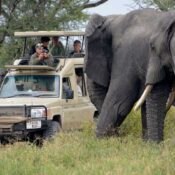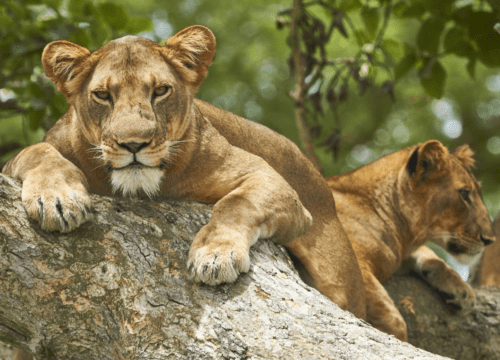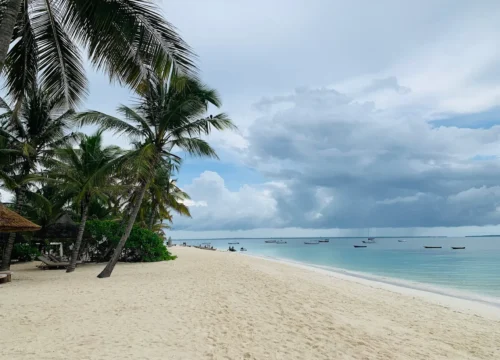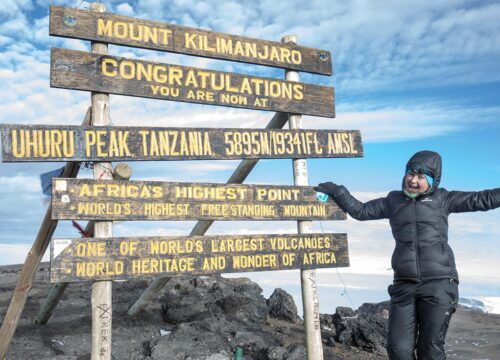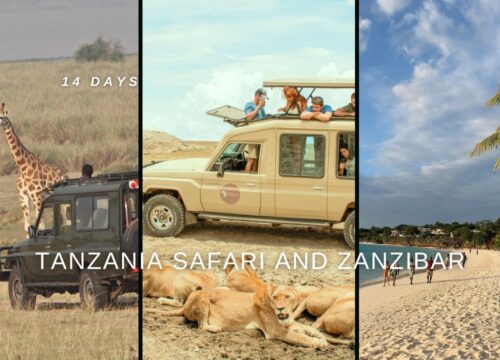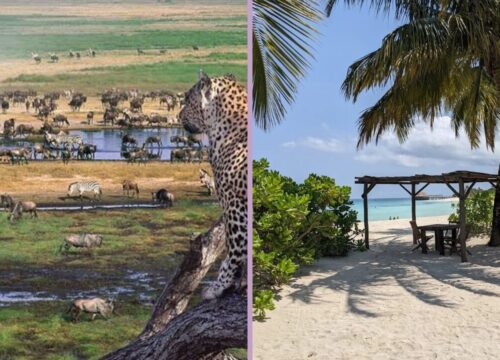What is Gorilla Trekking?
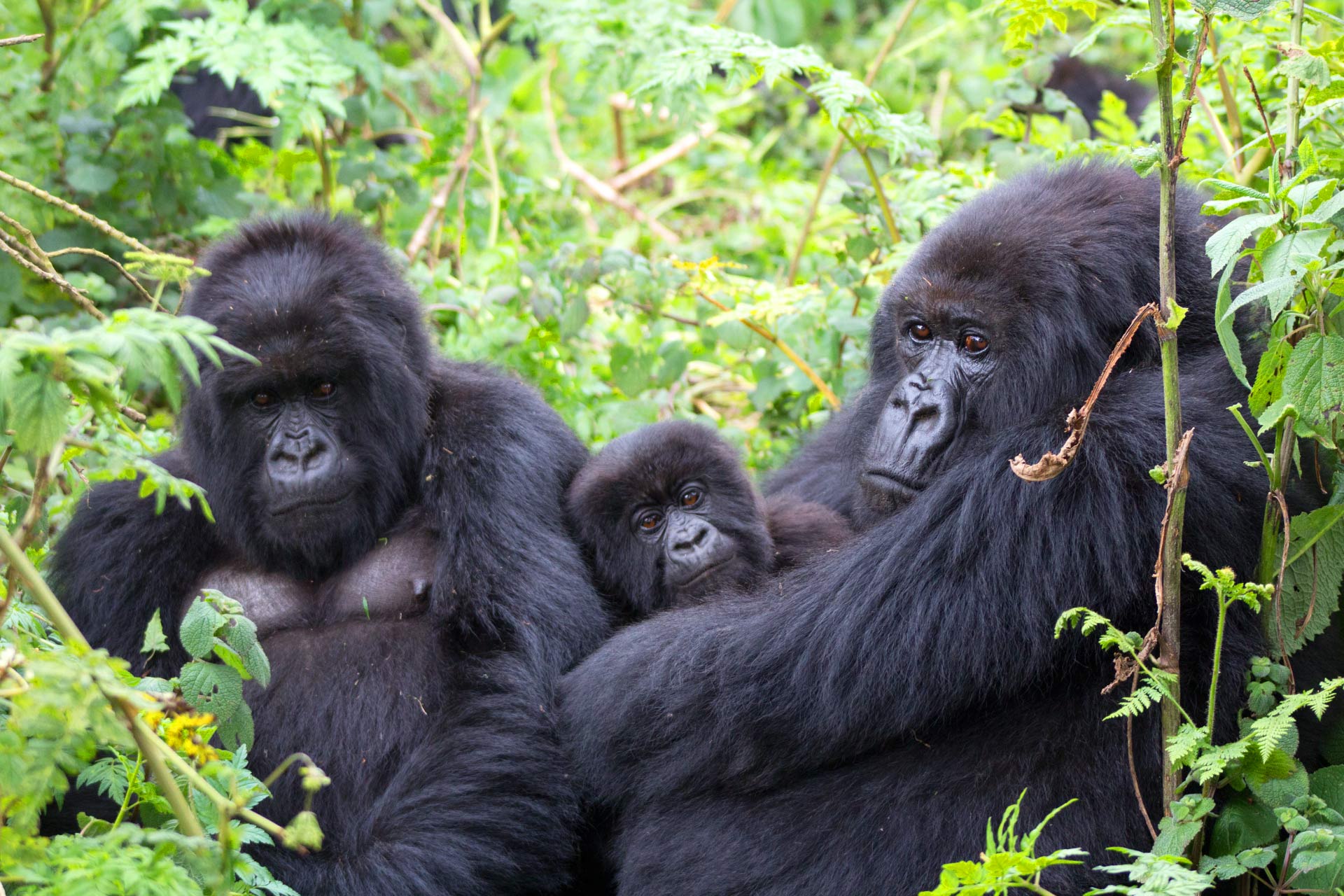
Gorilla Trekking
What is Gorilla Trekking? Gorilla trekking is an adventurous and often life-changing experience where individuals hike through dense forests to observe and interact with wild gorillas in their natural habitat. It typically involves guided tours led by experienced trackers who know the habits and movements of the gorilla groups within the area.
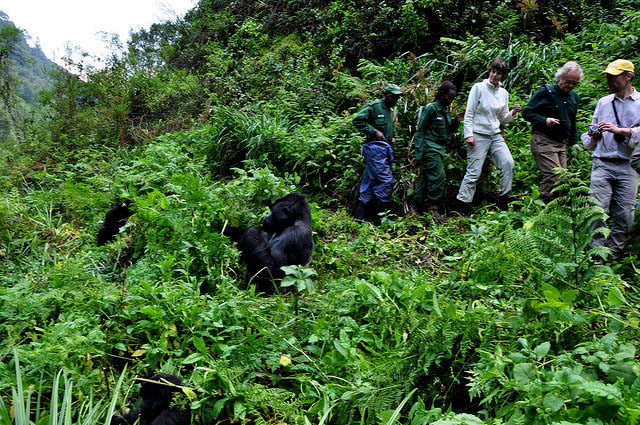
This activity is primarily conducted in regions of Central and East Africa where mountain gorillas and lowland gorillas are found, such as Uganda, Rwanda, and the Democratic Republic of Congo.
What is Gorilla Trekking?
Gorilla trekking requires participants to hike through rugged terrain, sometimes for several hours, to reach the location where the gorillas are located. Once the gorilla group is found, trekkers are allowed a limited amount of time (usually around one hour) to observe and take photos of the gorillas from a safe distance, ensuring minimal disturbance to the animals.
The experience of seeing these majestic creatures up close in their natural habitat is considered a privilege by many and often fosters a deeper appreciation for wildlife conservation efforts. It also contributes to the local economies of the regions where gorilla trekking occurs, supporting conservation initiatives and providing income for local communities.
How difficult is gorilla trekking in Uganda?
Gorilla trekking in Uganda can vary in difficulty depending on a few factors:

- Terrain: The terrain in Uganda’s gorilla trekking regions, such as Bwindi Impenetrable National Park and Mgahinga Gorilla National Park, can be rugged and challenging. Trekkers may encounter steep slopes, dense vegetation, and muddy paths, which can make the hike physically demanding.
- Altitude: Some gorilla groups may reside at higher altitudes, which can pose challenges for individuals who are not acclimated to such elevations. Altitude sickness is a possibility for some trekkers, although it’s generally not severe given that the highest altitudes in Uganda’s gorilla trekking areas are not extreme.
- Weather: Weather conditions can also impact the difficulty of gorilla trekking. Uganda’s gorilla habitats experience both rainy and dry seasons. During the rainy season, trails may be muddier and more slippery, increasing the challenge of the trek.
- Duration of Trek: The duration of the trek can vary depending on the location of the gorilla group on a given day. Treks can range from a couple of hours to several hours each way, so physical stamina and endurance are important.
Despite these potential challenges, gorilla trekking in Uganda is generally considered manageable for individuals with a moderate level of fitness. It’s essential to follow the guidance of experienced guides and pace oneself during the trek. Additionally, porters are often available to help carry equipment and provide assistance along the way, which can alleviate some of the physical strain. Overall, while it may be physically demanding, the opportunity to encounter endangered mountain gorillas in their natural habitat makes the experience incredibly rewarding for many travelers.
Is Gorilla Trekking Dangerous?
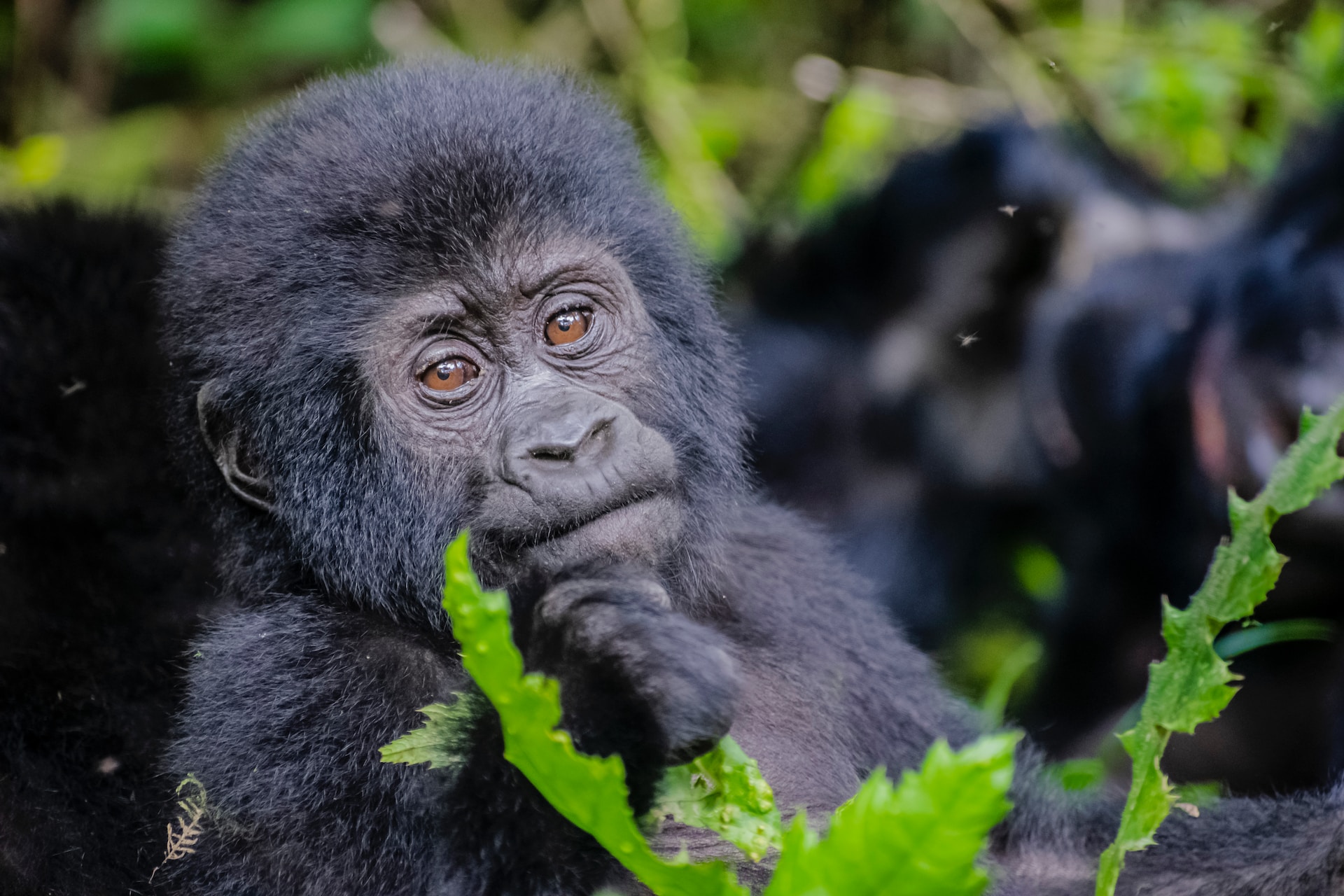
Gorilla trekking, when conducted responsibly and with experienced guides, is generally considered safe. However, there are inherent risks associated with being in close proximity to wild animals, including gorillas.
Here are some factors to consider regarding safety during gorilla trekking:
- Wildlife Encounters: While gorillas are generally gentle and non-aggressive animals, they are wild animals and their behavior can be unpredictable. There is always a possibility of unexpected encounters or situations during the trek.
- Terrain and Environment: The terrain in gorilla trekking areas can be challenging, with steep slopes, dense vegetation, and uneven paths. Trekkers need to be cautious to avoid slips, falls, or injuries.
- Health Risks: Gorilla trekking often involves hiking in remote areas where medical facilities may be limited. Trekkers should be in good physical health and prepared for the physical demands of the trek. Additionally, there may be risks of diseases such as malaria in some gorilla trekking regions.
- Security Concerns: In some areas where gorilla trekking occurs, there may be security concerns related to political instability or wildlife poaching. It’s important to stay informed about the current situation and follow any safety guidelines provided by local authorities or tour operators.
Despite these potential risks, gorilla trekking is typically considered a safe activity when conducted with reputable tour operator like Nextgen Safaris who prioritize safety and adhere to guidelines set by wildlife authorities. Experienced guides accompany trekkers during the entire journey, providing information, guidance, and ensuring the safety of participants and the gorillas. Following their instructions and respecting the gorillas’ natural habitat are crucial for a safe and enjoyable experience.
Is Rwanda or Uganda better for gorilla trekking?
Deciding between Rwanda and Uganda for gorilla trekking depends on various factors, including personal preferences, budget, and travel logistics. Here are some points to consider when comparing the two:
- Gorilla Population and Habituation: Both Rwanda and Uganda are home to populations of endangered mountain gorillas, but the habituated gorilla groups may differ between the two countries. Rwanda’s Volcanoes National Park is known for relatively easier access to gorilla groups, with several habituated families. Uganda’s Bwindi Impenetrable National Park and Mgahinga Gorilla National Park also offer gorilla trekking opportunities, but the terrain and trekking difficulty may vary.
- Cost: Rwanda is often considered more expensive for gorilla trekking compared to Uganda. The cost of gorilla trekking permits in Rwanda is generally higher than in Uganda. However, Rwanda’s shorter travel distances and potentially lower accommodation and transportation costs within the country may offset some of the differences.
- Travel Logistics: Rwanda’s Volcanoes National Park is located closer to the capital city, Kigali, making it more accessible for travelers with limited time. Gorilla trekking in Uganda may require longer travel distances, especially if flying into Entebbe or Kampala and then traveling to Bwindi Impenetrable National Park or Mgahinga Gorilla National Park.
- Terrain and Trekking Experience: The terrain and trekking experience can vary between Rwanda and Uganda. Rwanda’s Volcanoes National Park is known for relatively shorter trekking distances and less challenging terrain compared to some parts of Uganda’s gorilla habitat. However, both countries offer diverse landscapes and immersive experiences in the forest.
- Other Wildlife and Attractions: Both Rwanda and Uganda offer opportunities for additional wildlife viewing and cultural experiences beyond gorilla trekking. Uganda, often referred to as the “Pearl of Africa,” boasts a wide range of wildlife species, including chimpanzees, elephants, and diverse birdlife, as well as scenic attractions such as the Rwenzori Mountains and the source of the Nile River.
Ultimately, the choice between Rwanda and Uganda for gorilla trekking depends on individual preferences, budget, and travel priorities. Both countries offer unique and unforgettable experiences with mountain gorillas, and either destination can provide a memorable adventure for wildlife enthusiasts.
A Guide to Gorilla Trekking
ENTRY REQUIREMENTS:
On your Gorilla Trekking Safari to Uganda or Rwanda, all visitors must have a valid passport with at least 4 consecutive blanks pages. Any applicable visa and/or relevant documentation are the responsibility of the traveller. For further information on Visa requirements visitors are advised to contact their nearest Uganda or Rwanda Embassy or Consulate. Apply Visa online here
LANGUAGE:
English
TIME:
GMT +3
VOLTAGE:
220 Volts/AC50Hz. Sockets are UK style, 3 pin square plugs. Power is from the UMEME in the city/major towns and generator with inverter back up in the Safari Lodges and Camps.
CURRENCY:
Foreign currency must be changed at the Bank, Bureau de Change, and Hotel/Safari lodge/Camp/Resort. Major Credit Cards, Master card, Visa, American Express, are usually accepted throughout the country. Where credit cards are accepted, the payment will normally be recorded in US$ regardless of the card’s default currency.
CLOTHING:
Dress is mainly informal and should be comfortable as well as practical. Something warm should be brought along for early morning and evenings. Safari clothes are available from hotels/lodges/camps.
BAGGAGE:
Where possible, travel light. Baggage space on safari is limited to medium suitcase or soft bag per person plus reasonable amount of hand luggage. There is 15 Kilogram per person limit on all flights to the wildlife sanctuaries. Excess luggage must be stored in your arrival hotel.
WATER:
You will find many different of opinion of what is safe and what is not. We recommend for peace of mind, to drink local Bottled Mineral water. It is important to drink plenty of water especially during the hotter months. We would recommend that guests drink at least 2 to 3 liters of water per day to limit the effects of dehydration.
HEALTH;
East Africa is a safe and secure destination; however, it is a good idea to take a few precautions. Kindly consult your GP or local doctor at least 6 weeks before you travel, with regards:
Malaria prophylactics. East Africa is a known malaria area and preventive measures are essential. You are advised to take one of the recommended anti-malarial drugs. Be sure to wear long sleeved shorts and trousers after sunset and spray the exposed parts of your body with a mosquito repellent spray
Remember to protect yourself from direct sun rays with sunscreen cream or safari hat.
DIETARY REQUIREMENTS:
For those guests with specific dietary requirement, please ensure we are notified prior to travel
GRATUITIES:
As a guideline and dependent on how happy you are, we would suggest the following:
The General Hotel/Lodge/Camp Staff – Approximately U$ 10.00 per person per day
Driver Guides – Approximately US$ 15.00 to US$ 20.00 per person per day
PHOTOGRAPHY:
Please be careful when photographing public buildings, airports, bridges, the national flag and people in uniform. Ensure that you have sought permission before photographing local people and their villages. If in doubt, please check with your guide.
Read about
10 Things you Should NOT DO on an African Safari.
What to expect on a safari in Uganda.
Bwindi Impenetrable National Park
How to Choose the Best Tour Operate for Your Safari in Africa
12-Day Gorilla Tracking in Bwindi
Some of our African Safaris
1 Day Jinja Ultimate tour Experience
1 Day White Water Rafting in Jinja
3 Days Bwindi Gorilla Habituation via Rwanda
3 Day Birding Safaris and Photography in Uganda
3 Day Safari to Queen Elizabeth National Park
3 Day fly in Gorilla Trekking Safari from Masai Mara
3 Day Grand Gorilla Trekking Safari
4 Day Chimpanzee and Gorilla Trekking Safari
4 Day Murchison Falls and Jinja tour
Gorilla Trekking Safaris
1 Day Uganda Gorilla Trekking Safari from Kigali Rwanda
2 Days Rwanda Gorilla Trekking
3 Days Fly in Gorilla Habituation Safari
3 Days Budget Gorilla Safari in Uganda
3 Days Customizable Rwanda Gorilla Tracking Safari
3 Days Gorilla Trekking Experience and Lake Bunyonyi
3 Days Last Minute Gorilla Trekking & Lake Bunyonyi in Uganda
3 Days Rwanda to Uganda Gorilla Safari
3 Days Uganda Gorilla Safari from Kigali
4 Days Gorilla and Golf Safari in Uganda
4 Days Rwanda Gorilla Adventure
5 Day Gorillas and Game Drive Safari
5 Days Golf and Gorilla Safari in Uganda
5 Days Rwanda Gorillas and Culture Tour
6 Day Uganda Gorilla and Wildlife Tour
6 Days Budget African Safari with Gorilla Trekking
7 Days Gorilla and Chimpanzee Trekking in Uganda
7 Days Uganda Budget Gorillas and Primate Trip
8 Days Gorilla Trekking Vacation to Bwindi National Park
8 Days Uganda Gorilla and Chimpanzee Safari
Recent Posts
Victoria Falls Safari with Tanzania Extension
Last Minute Deals
Quick booking process
+49 1575 4711313

